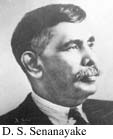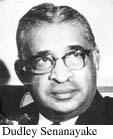
17th September 2000
News/Comment|
Editorial/Opinion| Business| Sports|
Sports Plus| Mirror Magazine

Sagacious Senanayakes of Sri Lankan politics
By P.M. Senaratne
In the sphere of Sri Lankan politics, the Senanayakes from Botale Walauwa, Mirigama, have continued to be a significant factor. They have represented the Sri Lankan legislature for three generations. The
advent of this family into the socio-political arena dates as far back
as the 1920s. A significant contribution was made by F.R. Senanayake in
propelling organizations such as the Y.M.B.A and the Temperance Movement,
the latter which was introduced to him by his father, Mudaliyar Don Spater
Senanayake.
The
advent of this family into the socio-political arena dates as far back
as the 1920s. A significant contribution was made by F.R. Senanayake in
propelling organizations such as the Y.M.B.A and the Temperance Movement,
the latter which was introduced to him by his father, Mudaliyar Don Spater
Senanayake.
Despite the hard work pertaining to much needed social reforms of the time by the three Senanayake brothers (D.C, F.R. and D.S), whether it be through the Lanka Mahajana Sabha where D.S. and D.C. were prominent members or through the Y.M.B.A. which F.R. and brother D.C. heavily financed and tirelessly worked for, the direct involvement in politics and affairs of the state fell upon D.S's shoulders. There were two reasons for this. Firstly F.R. (Frederick Richard) expired while on a pilgrimage to Buddha Gaya in 1925, and D.C. (Don Charles) who was known to be the man behind the scenes shunned the limelight. The youngest brother D.S. therefore became the natural choice.
1931 proved to be a significant year in the history of Ceylon and that of the Senanayake family. It was the year that the country gained universal franchise and the elections to the State Council were held. Don Stephen Senanayake was returned as the uncontested representative of the Minuwangoda electorate. He had the distinction of being the first Minister of Agriculture in the post-independence era. During this period D.S. achieved phenomenal success. The numerous irrigational schemes completed by him and the many colonization settlements established with a view to securing Sri Lanka's agro-industry and self-sufficiency in essential foods, is largely if not wholly the brainchild of D.S. The Senanayake Samudra, the Parakrama Samudra, Nachchaduwa, Padaviya, Minipe, Minneriya, are just a few of the projects undertaken by him.
When in 1936, Sir D.B. Jayatilleke decided to accept the post as Ceylon's representative in India, his position as Leader of the House, in the State Council fell vacant and the natural choice for leadership fell on D.S. In the very same year Dudley Shelton Senanayake had returned from England, when he had not only obtained a natural science tripos at the University of Cambridge, which was followed by an M.A,. but had also qualified as a Barrister-at-Law. Immediately after his return, he had been coaxed by friends, family and constituents to contest the Dedigama electorate, in which constituency, the Senanayakes owned considerable estates. Dudley only 24 at the time was elected with a majority of 8,299 votes. The Dedigama result was as follows.
Mr. Dudley Senanayake 17,045
Mr. N.H.Keertiratne 8,746
Mr. Richard Nugawela 737
Mr. T.B. Dedigama 560
Mr. T.B. Udalagama 179
Following his victory, he stated "I saw that those who sought election were all new-comers to politics. As I had decided to devote my whole life to politics, I saw here an opportunity to start early. I saw no reason why my youth should be a hindrance to an early beginning."
 1948
proved a momentous year for Sri Lanka and the Senanayake family. The country
was metamorphising from colony to sovereign state, and the Senanayakes,
father and son were to contest their respective seats Mirigama and Dedigama.
D.S. who lead the U.N.P to victory defeated his opponent with over 16,000
votes, polling in excess of 26,000 votes. Dudley too met with success.
1948
proved a momentous year for Sri Lanka and the Senanayake family. The country
was metamorphising from colony to sovereign state, and the Senanayakes,
father and son were to contest their respective seats Mirigama and Dedigama.
D.S. who lead the U.N.P to victory defeated his opponent with over 16,000
votes, polling in excess of 26,000 votes. Dudley too met with success.
After the formation of the first Parliament in 1948, under the premiership of the grand old Senanayake, Dudley assumed the office of Minister of Agriculture. In 1952, D.S expired after suffering a stroke while riding on the Galle Face Green. Lord Soulbury in his capacity as Governor-General appointed Dudley as the new Prime Minister. This lead to some controversy amongst senior U.N.P members, especially Sir John Kotalawela. In order to quell the various accusations hurled by certain factions, Dudley acted both honourably and democratically by immediately dissolving Parliament and calling for fresh elections. The outcome was an overwhelming victory for the U.N.P, which gained 54 seats and a personal one for Dudley securing Dedigama with a massive majority of 16,000.
Following the Hartal of 1953, instigated by the opposition Dudley resigned allowing Sir John to realize his long awaited ambition of becoming Ceylon's Prime Minister. Sir John himself was married to D.S's sister's daughter and Dudley's first cousin Euphemia. Quite apart from this connection he was also the son of Mrs. F.R. Senanayake's sister.
Dudley re-entered politics subsequently, and his final period as Prime Minister from 1965-1970 was by far the most significant. A unique achievement during these years was the strong co-operation he received from several parties such as the M.E.P., The Federal Party, and other independent groups. Unlike most coalitions the 1965-1970 Government functioned smoothly without dissension and this is generally known to be one of the most peaceful periods in Sri Lankan politics.
When speaking of the Senanayakes and politics one tends to forget Richard Gotabhaya (R.G). This razor-sharp politician was the eldest son of D.S's older brother F.R.
His impact on Sri Lankan politics was enormous. R.G. contested the 1947 election and was returned as the member for the constituency of Dambadeniya. He served Ceylon's first Parliament as Deputy Minister of Defence and Foreign Affairs and in 1952 as Minister for Trade and Commerce. In 1956, on the eve of elections, he was banished from the UNP on the grounds of criticizing the party. It was at this point that R.G. posed his challenge to his arch enemy J.R. Jayawardene. R.G. contested two seats as an independent, his own constituency of Dambadeniya, and that of J.R's Kelaniya. R.G. was victorious in both and still holds the distinction of winning two constituencies at an election. In fact the main election slogan adopted by the opposition in 1956 was "The UNP that R.G. rejected, the nation shall also reject."
R.G. continued to serve his Mother Lanka, in the SLFP Government headed by S.W.R.D. Bandaranaike, as the Minister of Trade. He is still referred to by the political nickname of 'China Dicky', a reference to his successful negotiations with China of the bi-lateral rubber-rice pact.
The third generation Senanayake, Rukman first entered Parliament in 1973 at the Dedigama by-election, the seat being left vacant after the demise of his illustrious uncle Dudley. His stint in Parliament was however brief. Today after much wandering in the political wilderness, he finds himself one of the UNP's senior most members representing the Polonnaruwa District where he polled nearly 50,000 votes.
It may be of incidental interest to note that former minister, General Ranjan Wijeyratne was a close relative of the Senanayake family. His mother Rosalind Senanayake was the first cousin of D.S.








![]()
Front Page| News/Comment| Editorial/Opinion| Plus| Business| Sports| Sports Plus| Mirror Magazine
Please send your comments and suggestions on this web site to

